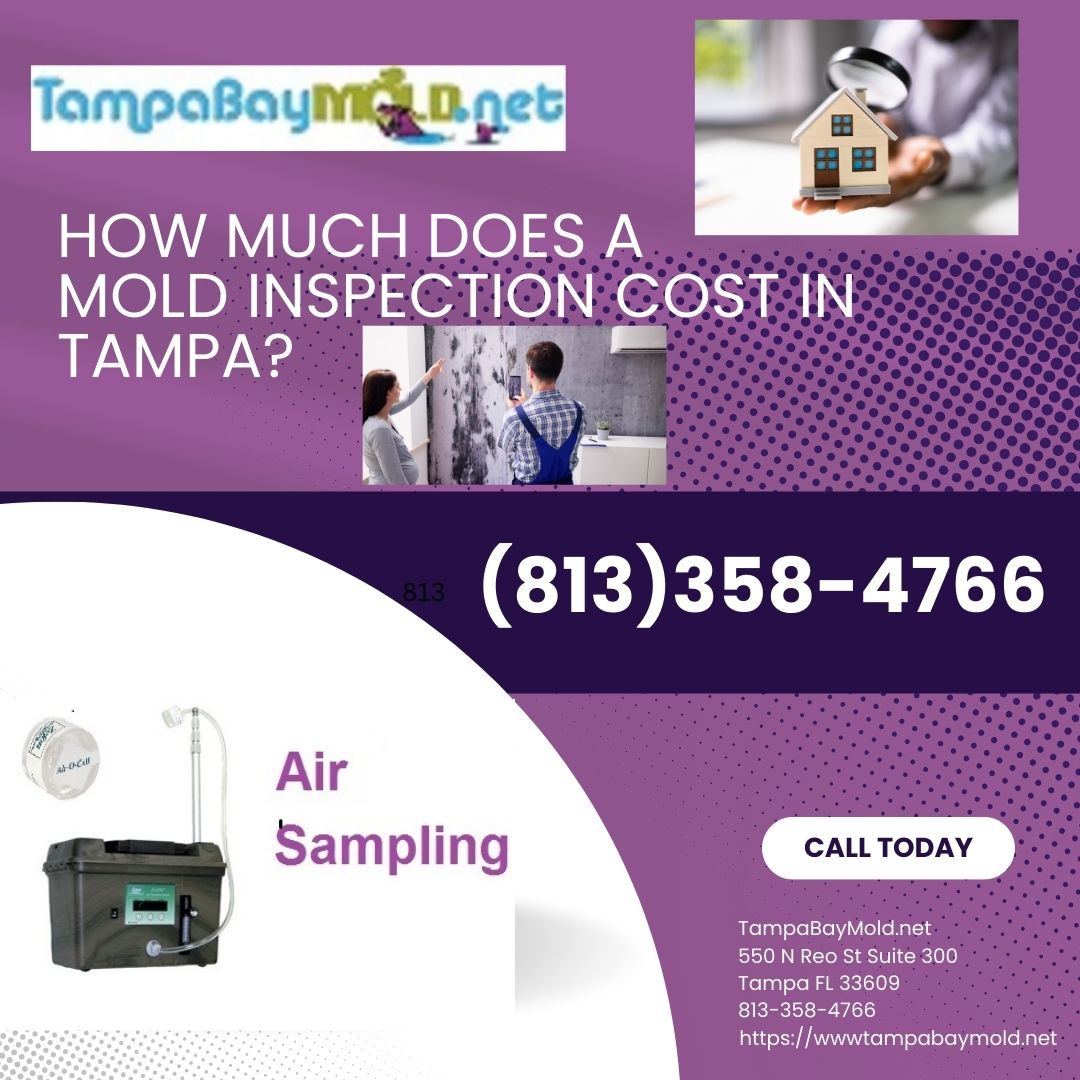How Much Does A Mold Inspection Cost In Tampa?
Key Takeaways
- Mold inspections in Tampa typically range from $300 to $500, depending on the size and layout of the property.
- Factors such as the extent of mold infestation and the type of mold significantly impact the cost.
- Regular maintenance and early detection are crucial in preventing costly mold problems.
- Understanding the local climate helps in predicting and managing mold growth
Discovering Mold Inspection Costs in Tampa
Living in Tampa means enjoying the sunshine and the beaches, but it also comes with its own set of challenges, especially when it comes to maintaining a healthy home. Mold is a common issue here due to the humid climate, and a mold inspection is often necessary to ensure your home is safe. But how much does a mold inspection cost in Tampa? Let’s delve into the details.
Importance of Mold Inspections
Mold inspections are crucial for maintaining a healthy living environment. Mold can grow undetected in hidden areas of your home, leading to health issues like allergies and respiratory problems. By getting a professional mold inspection, you can identify the presence of mold early on and take steps to eliminate it before it becomes a bigger problem.
Impact of Mold on Health and Property
Mold is not just an unsightly nuisance; it can also be a significant health hazard. It releases spores into the air that can cause respiratory issues, allergic reactions, and even more severe health problems for those with compromised immune systems. Besides health concerns, mold can also cause extensive damage to your property. It can weaken structures, damage walls, and ruin furniture.
In Tampa, where humidity levels are high, mold can thrive and spread quickly if not addressed. This makes regular inspections an essential part of home maintenance.
Understanding Local Environmental Factors
Tampa’s warm and humid climate is the perfect breeding ground for mold. The frequent rain and high humidity levels create an environment where mold can easily grow, especially in poorly ventilated areas. Understanding these local environmental factors can help you take preventive measures and keep your home mold-free. For more detailed insights, you might consider a South Tampa mold inspection to assess potential risks in your home.
Main Factors Influencing Mold Inspection Costs
Several factors can influence the cost of a mold inspection in Tampa. By understanding these factors, you can better prepare for the expenses and make informed decisions.
Property Size and Samples Taken
The size of the property and the number of samples taken are primary determinants of the inspection cost. Larger homes take more time to inspect and require more resources, which may increase the cost. Additionally, homes with complex layouts or hard-to-reach areas may require more thorough inspections, which may contribute to higher costs. For more insights, consider reading about South Tampa mold inspection services.
Extent of Mold Infestation
The extent of mold infestation also plays a significant role in determining the cost. A minor mold issue might be quickly assessed, while extensive mold growth requires more detailed inspection and possibly additional testing, raising the overall cost.
Average Cost of a Typical Mold Inspection
In Tampa, the cost of a typical mold inspection generally falls between $300 and $500. This range can fluctuate based on various factors such as the size of the property and the complexity of the inspection. For instance, a small apartment might cost on the lower end, while a large multi-story home could push the cost towards the higher end of the spectrum. It’s important to get an accurate quote from a professional who can assess the specifics of your property.
Additional Potential Charges
Besides the basic inspection and testing costs, there might be additional charges to consider. These can include additional samples being taken or emergency fees for inspections where samples are rushed for a quicker turnaround at the lab.
Tips for Tampa Homeowners to Reduce Mold Inspection Costs
While mold inspections are essential, there are ways to manage and potentially reduce the costs involved. Being proactive and informed can save you both time and money in the long run.
- Schedule regular maintenance checks.
- Choose a reputable and experienced inspector.
- Stay informed about the types of testing available.
Additionally, confirm that the company is licensed and has a good reputation for both inspection and remediation. This ensures quality service and reduces the risk of further issues.
Regular Property Maintenance to Prevent Mold
Maintaining your property is one of the best ways to prevent mold growth. Regularly check for leaks, ensure proper ventilation, and keep humidity levels in check. Simple actions like fixing leaks promptly and using dehumidifiers can make a big difference.
Moreover, keeping an eye on the weather and preparing your home for Tampa’s humid climate can help prevent mold. For example, during the rainy season, ensure your gutters are clean and functioning properly to prevent water accumulation.
Choosing the Right Mold Inspection Professionals
Finding the right professional is crucial. Look for inspectors with a solid reputation and relevant certifications. Ask for recommendations from friends or neighbors who have had mold inspections, and read reviews online to gauge the quality of service.
When speaking with potential inspectors, don’t hesitate to ask about their experience and the methods they use. A knowledgeable inspector will be transparent about their process and fees, helping you feel confident in your choice.
Choosing the right professional not only ensures a thorough inspection but also provides peace of mind. You want someone who will not only identify the problem but also offer practical solutions tailored to your needs.
“It’s not just about finding mold; it’s about understanding the environment and taking steps to prevent it in the future.”
Steps to Prepare Your Home for a Mold Inspection
Preparing your home for a mold inspection can help the process go smoothly and efficiently. Here are a few steps to ensure your home is ready. For more detailed guidance, consider checking out this complete service guide on mold inspection.
Clearing Clutter and Ensuring Accessibility
Before the inspector arrives, clear away any clutter that might obstruct access to areas like windows, attics, and crawl spaces. The inspector needs to have clear access to these areas to perform a thorough inspection.
Setting the Right Expectations
When preparing for a mold inspection, it’s crucial to set realistic expectations about what the process will entail and what it can achieve. It’s also important to understand that while an inspection can identify mold and its sources, it won’t resolve the issue. Mold Remediation is a separate process that will follow the inspection if mold is found. Therefore, be prepared for the possibility of additional steps and costs if mold is detected.
Lastly, remember that the goal of the inspection is to ensure a safe and healthy living environment. While the process may seem daunting, it’s a necessary step in maintaining the integrity of your home and the health of its occupants.
Final Insights on Managing Mold Inspection Expenses
Managing mold inspection expenses in Tampa requires a proactive approach and informed decision-making. By understanding the factors that influence costs and taking steps to mitigate them, you can effectively manage your budget while ensuring a thorough inspection. For more information on mold inspection benefits, check out our guide to ensuring healthy home air quality in your Tampa home.
Consider the value of early detection and regular maintenance as preventive measures. These actions can help avoid the need for costly remediation later on. Additionally, being informed about the inspection process and potential costs can help you make confident decisions and avoid unexpected expenses.
Evaluating Inspection Reports Thoroughly
Once the inspection is complete, you’ll receive a detailed report outlining the findings. It’s essential to review this report thoroughly and ask questions if anything is unclear. Understanding the report is crucial for making informed decisions about the next steps, whether that involves remediation or ongoing monitoring.
Look for details about the location, type, and extent of mold found, as well as any recommendations for remediation. A good inspector will provide clear explanations and guidance on how to address the issues identified in the report.
Making Informed Decisions Based on Findings
Armed with the information from the inspection report, you can make informed decisions about how to proceed. If remediation is necessary, consider getting multiple quotes to ensure you’re getting a fair price. Additionally, weigh the benefits of addressing the issue promptly versus the potential risks of delaying action.
Frequently Asked Questions
As a homeowner in Tampa, you may have several questions about mold inspections and what they entail. Here are some common questions and answers to help guide you.
How often should I get a mold inspection in Tampa?
It’s generally recommended to have a mold inspection annually, especially in humid climates like Tampa. However, if you notice signs of mold or experience unexplained health symptoms, consider scheduling an inspection sooner.
Can I perform a mold inspection myself?
While you can perform a basic visual inspection yourself, professional mold inspections are more thorough and can detect hidden mold that you might miss. Professionals have the tools and expertise to identify mold accurately and provide a detailed assessment.
DIY inspections might help you identify obvious mold, but they won’t provide the same level of accuracy or detail as a professional inspection. For peace of mind and a comprehensive understanding of any mold issues, hiring a professional is the best course of action.
What should I do if mold is discovered during inspection?
If mold is discovered during the inspection, follow the recommendations provided in the inspection report. This may involve hiring a remediation professional to remove the mold and address any underlying issues that contribute to mold growth, such as leaks or poor ventilation.
Are mold inspections covered by homeowners insurance?
Homeowners insurance policies vary, so it’s important to check with your provider. Some policies may cover mold inspection and remediation if the mold is the result of a covered peril, such as a burst pipe. However, mold caused by neglect or maintenance issues is typically not covered.
How do I find a reliable mold inspector in Tampa?
To find a reliable mold inspector in Tampa, seek recommendations from friends, family, or neighbors who have had inspections. Additionally, check online reviews and verify the inspector’s credentials and certifications. A reputable inspector will be transparent about their process and fees and provide references upon request. For more information, consider reading about the value of mold inspections in Tampa.


